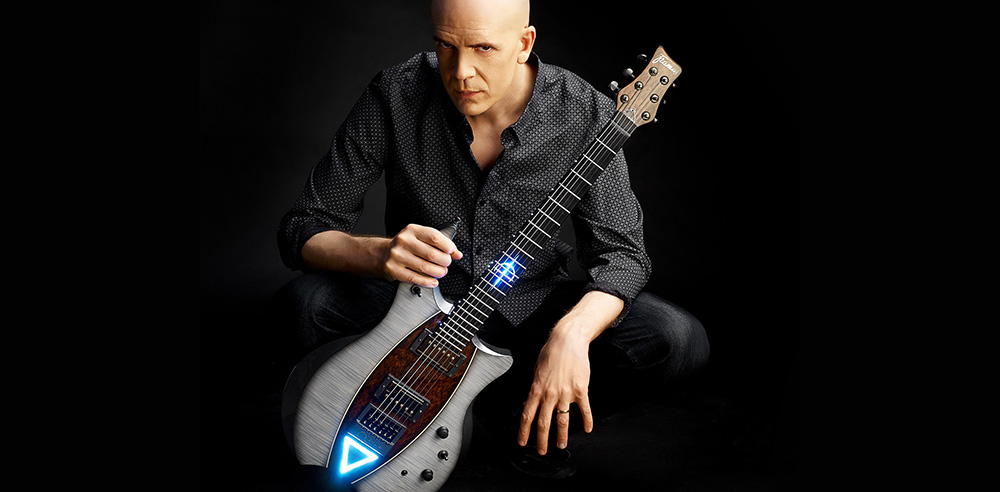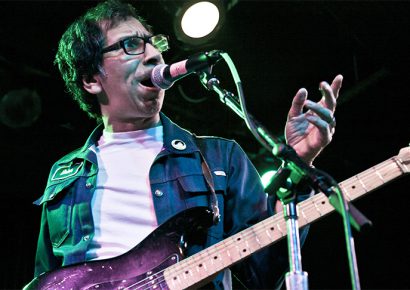“That’s a good question. I’ll start by saying this: all I do right now is play bass. I don’t play guitar at all. All I do is play bass, all day! Like, really, my fingers are shot. I play bass all day. And I think that leads me to, what do I see guitar as? Well I see it as a bunch of things. I see it as a tool. I see it as a weapon. I see it as a bunch of blocks. I see it as a bunch of patterns. I see it as a bunch of baggage as well. And because I’ve been in this weird tuning for so long [CGCGCE], I see it as almost exclusively a writing tool as opposed to anything else. Inevitably someone will put a guitar in your hands and be like, ‘Well, play something!’
“But I use it to write songs, y’know?” He continues. “I’m a guitar player, of course. I saw an interview with Steven Wilson where he’s like, ‘I’m not a guitar player,’ but I mean, he is a guitar player! I’m a guitar player. I love the guitar. But I agree with him in the sense that I’m not a guitar player in the way of my identity being invested in my ability to do things on it. I’ve got a certain capacity for technique that allows me to articulate pretty much anything that comes into my head. And a lot of the things that come into my head are rarely the types of things that require acrobatics. But when people put a guitar in my hand and they’re like, ‘Solo!’ What am I supposed to do?
“So I’ve got a reservoir of ten or twelve shapes that I’ve been playing for 30 years that I’ll pull out. But the reason why I have those in a place technically that allows me to perform them marginally well is that those shapes I can apply to almost any idea that I have, whether it’s the sweeping or the tapping or the string skipping or the riffing, those shapes allow me to play any thought that I have. And that’s what I do! So when I sit down to record I’m always in shape, guitar-wise. Whether I’m playing bass or guitar, regardless, I’m in shape. It’s been years since I’ve not played. So in that sense, yeah, I’m a guitar player in the same way that Steven Wilson or anybody is. But it is truly a vehicle for me to articulate my emotional or artistic process, and that’s where it ends.
“So for me, bass is much more interesting because there’s something about it that’s just really, really soul satisfying to me,” admits Townsend. “The lack of need for it to be in the spotlight – and there’s a certain Zen in being able to be disciplined enough to play the same thing for five minutes. I’m into Massive Attack. Y’know, being able to play an awesome riff without it deviating for five minutes, I love that! And now, guitars… I’m infatuated with the actual physicality of it. And I’ve been fortunate to work with these brilliant companies recently, like Framus and Sadowsky in particular. Unbelievable instruments, right? And because I’ve got that opportunity I’m like, ‘Dude, let’s just put lights on ’em!’ I’ve got my writing guitars, a Tele and a Strat and a Les Paul and I’m good to go, so my stage guitars? Dude, let’s just make these things audacious!
“I think the Casualties of Cool record was a huge thing for me,” Townsend explains. “I’ve been doing the metal stuff happily and proactively for many years but the type of guitar sound that I really find the most inspiring is a half-distorted sound. The least amount of options in terms of amp and guitar is the best for me. I mean, I’ve always got reverbs and delays and all that, which I certainly enjoy using, but when it comes to amps and guitars, the least amount of options possible I find the most amount of creative stimulus from. If it’s a good instrument, you’re focusing more on what you’re working on rather than utilising all the bells and whistles of the guitar. So a single coil Telecaster is pretty much the ideal guitar for me, I would imagine. And an amp with between one and three knobs and anywhere between 15 and 40 watts is perfect. I find that most of my writing has typically been written with octaves because then the tonalities get filled in with the myriad of other things I want to orchestrate it with. So starting with octaves and all that when I actually start recording is something I can fill in with a heavier sound or whatever. But while I’m writing, having a half-distorted sound allows me to play those intervals and the chords that will eventually be built up in a way that implies the whole song to me. And single coils, simple gear, really allows me to get to the point much quicker.”
Transcendence is out now via Inside Out Music/Sony Music Australia. For more details, head to hevydevy.com.

